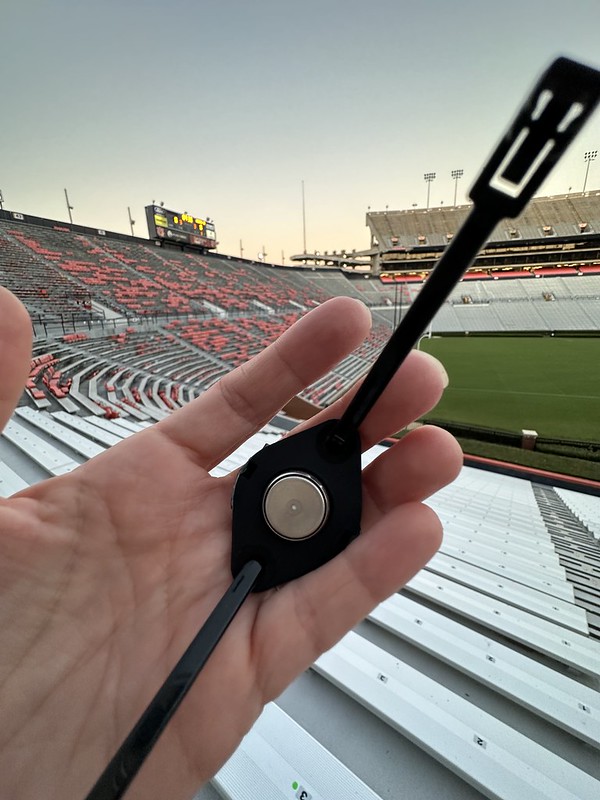Auburn student to put class study to use in battling heat at Saturday’s football game
Article body
Auburn University’s football players won’t be the only students whose expertise is on display in the heat this Saturday.
Graduate student Brandon Ryan, who is seeking a doctorate in Auburn’s Earth System Science program, will be spearheading a heat study project in Jordan-Hare Stadium during the Tigers’ game against the University of Massachusetts.
The heat study involves 15 sensors, known as iButtons, that Ryan and his climatology professor, Chandana Mitra, have strategically placed in Jordan-Hare to measure temperature and humidity — all aimed at identifying areas in the stadium that are most vulnerable to heat so they can be addressed to keep fans as safe from extreme conditions as possible.
“If we can pinpoint those locations, we can figure out the best places for remediation and cooling stations,” Ryan said.
Mitra, an associate professor in the Department of Geosciences, said the project should yield very helpful findings.
“We can find the variability in different parts of the stadium — which side is hotter than the other — so that thermal comfort isn’t compromised,” Mitra said.
Mitra added it’s important to note that thermal discomfort isn’t only directly related to sunlight, and that’s why the heat sensors measure more than just temperature.
“What we don’t realize is that in the evening the humidity can be higher,” she said. ”The apparent temperature, which is the humidity and temperature, adds up to one’s thermal discomfort.”
Auburn University Director of Emergency Management Floyd Johnson said the addition of the sensors is greatly appreciated by his department, especially considering that temperatures during the first few games could peak in the mid-to-upper-80s. From an emergency management standpoint, he said the sensors will help identify hot spots so first responders and cooling stations can be placed in the most strategic areas.
“If we can predict it, we can prevent it,” he said of the importance of such proactive measures.
One of those efforts will involve new “cooling spots.” This year, Carrier cooling stations, which consist of single-unit, ductless air conditioners, will be dispersed around the stadium. There also will be a dedicated cooling tent by the main first-aid station, just inside Gate 16, if fans need additional rest from the heat in a more enclosed area.
As in past years, 10 large water containers will likewise be present near the concession areas of Jordan-Hare for those in need of refilling water bottles. The containers will be monitored and maintained throughout the game.
Students will be able to grab an ice-cold bottle of water upon entry, provided by Coca-Cola.
Additionally, fans are permitted to bring in their own bottle of water. It must be a clear water bottle that is factory-sealed. Fans also may continue to bring in empty water bottles or cups that can be refilled at the filtered water stations.
As for the sensors, Ryan is excited to see how his study might improve the fan experience at Jordan-Hare. He said he hopes the project also is an encouragement to fellow students and their work in the way of research.
“At the end of the day, we are part of the Auburn community,” he said. “You get to have a real impact on a community that we care about. That is the most exciting part about science, and when we can make real change, it’s great.”
Related Media
Media interested in this story can contact Communications Director Preston Sparks at (334) 844-9999 or preston.sparks@auburn.edu.
Auburn University is a nationally ranked land grant institution recognized for its commitment to world-class scholarship, interdisciplinary research with an elite, top-tier Carnegie R1 classification, life-changing outreach with Carnegie’s Community Engagement designation and an undergraduate education experience second to none. Auburn is home to more than 30,000 students, and its faculty and research partners collaborate to develop and deliver meaningful scholarship, science and technology-based advancements that meet pressing regional, national and global needs. Auburn’s commitment to active student engagement, professional success and public/private partnership drives a growing reputation for outreach and extension that delivers broad economic, health and societal impact.






